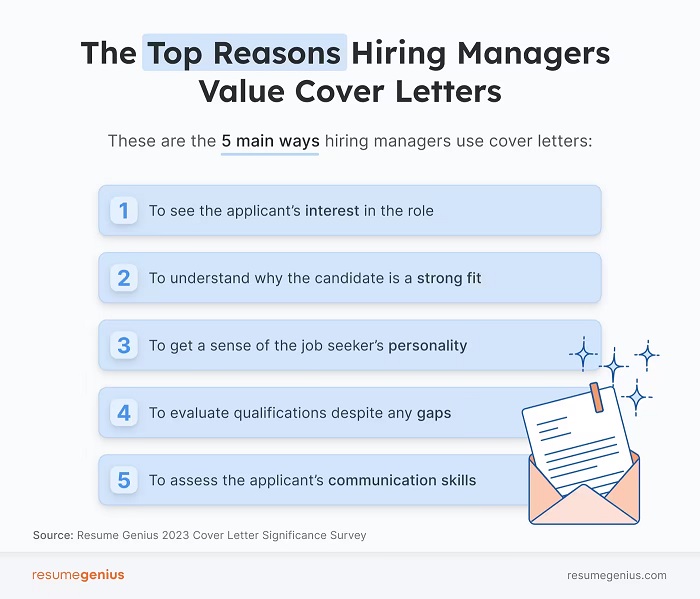In today’s competitive job market, a strong cover letter can make all the difference. While most candidates skip this step, those who invest time in crafting a compelling letter gain a significant advantage.
Why a Cover Letter is Your Secret Weapon
- Stand Out from the Competition: Only 2% of candidates submit well-written cover letters, giving you an edge.
- Capture Hiring Managers’ Attention: 83% of recruiters read cover letters, increasing your chances of being noticed.
- Showcase Your Personality: A resume presents skills, but a cover letter highlights your motivation and character.
- Boost Your Application’s Impact: A strong cover letter increases your visibility by 38%.
- Demonstrate Initiative: 72% of recruiters expect cover letters, even when optional.
- Explain Career Transitions: Use this space to clarify employment gaps or career shifts.
The Role of Cover Letters in the Age of AI
With AI-driven hiring processes becoming more prevalent, some job seekers assume that cover letters are no longer necessary. However, automated systems often prioritize structured data, leaving hiring managers to evaluate soft skills and personality through cover letters. A well-crafted letter can bridge the gap between AI filtering and human decision-making, helping you stand out in a sea of automated applications.
By including a thoughtful cover letter, you not only meet recruiter expectations but also demonstrate a personal touch that AI-generated resumes lack. This combination of automation and personalization ensures your application has the best chance of success.
To make the process easier, leverage AI-powered tools like Cover Letter for best offer to create tailored, professional cover letters in minutes.
Common Mistakes to Avoid in Your Cover Letter
Even a well-intended cover letter can backfire if it contains certain pitfalls. Here are some common mistakes that job seekers should avoid:
- Being Too Generic: Using the same cover letter for every job application significantly reduces its impact. Hiring managers can easily spot a generic letter that lacks personalization.
- Repeating Your Resume: A cover letter should complement your resume, not restate it. Focus on adding new insights, such as why you’re passionate about the role or how your values align with the company.
- Making It Too Long: Recruiters often skim through applications, so keep your cover letter concise—ideally no longer than one page.
- Failing to Address the Hiring Manager: Whenever possible, address your cover letter to a specific person rather than using a generic “To Whom It May Concern.”
- Overlooking Formatting and Grammar: Spelling errors or poor structure can make a negative impression. Always proofread your cover letter before submitting it.
By avoiding these common pitfalls, you can ensure your cover letter enhances your application rather than hurting your chances.
How to Join the Top 2% of Applicants
- Customise Every Cover Letter: Address the company’s needs and highlight relevant experience.
- Align with Job Requirements: Clearly demonstrate how your skills match the role.
- Show Genuine Enthusiasm: Passion for the job can make a lasting impression.
Common Cover Letter Mistakes to Avoid
Even a strong cover letter can lose its impact if it contains common mistakes. Avoid these pitfalls to ensure your application stands out for the right reasons:
- Being Too Generic: Recruiters can easily spot templated letters. Tailor each one to the job and company.
- Repeating Your Resume: A cover letter should complement, not duplicate, your resume. Use it to provide context and highlight your motivations.
- Focusing on Yourself Instead of the Employer: Shift the focus from what you want to what you can offer the company.
- Ignoring Formatting and Length: Keep your cover letter concise (250-400 words) and well-structured for readability.
- Skipping Proofreading: Typos and grammatical errors can make a negative impression. Always review before submitting.
By avoiding these mistakes and refining your cover letter, you increase your chances of making a strong impact and securing an interview.
With hiring managers spending as little as 30 seconds reviewing cover letters, every detail matters. Instead of submitting generic applications, focus on crafting a standout letter and secure more interviews. Be part of the 2% who turn job applications into career opportunities.
